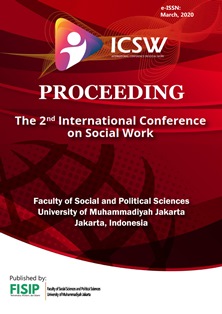CONTEXTUAL ACCEPTANCE OF PHYSICAL VIOLENCE AGAINST WIVES: SURVEY AMONG INDONESIAN SOCIAL WORK STUDENTS
Keywords:
contextual acceptance, physical violence, social work education, violence against wivesAbstract
As social workers have high potential of dealing with issues of violence against women, it is important for students studying to enter the profession to be well prepared with the competence to deal with them. This study investigates associations between factors derived from feminist, social learning and socio-demographics perspectives and contextual acceptance of physical violence against wives. Respondents were 438 male and female undergraduate students recruited from four private and public universities in four Indonesian provinces. The study found that students who knew the victim well, studied at universities in Western Indonesia, were Muslim, reported high religiosity and egalitarian attitudes toward gender roles tended to report non-justification of wife beating. Findings were discussed within the framework of social work education strategy to improve social work students’ attitudes toward violence against wives.References
Bryant, A., & Spencer, A. (2003). University students’ attitudes about attributing blame in domestic violence. Journal of Family Violence, 18, 369-376.
Danis, F. S. (2004). Factors that influence domestic violence practice self-efficacy: Implications for
social work. Advances in Social Work, 5, 150-161.
Danis, F. S., & Lockhart, L. (2003). Domestic violence and social work education: What do we know,
what do we need to know? Journal of Social Work Education, 39, 215-224
Dobash, R. E., & Dobash, R. P. (1979). Violence against women: A case against the patriarchy. New
York: Free Press
Eastman, B.J., Bunch, A., Williams, H., & Carawan, L.E. (2007). Exploring the Perceptions of
Domestic Violence Service Providers in Rural Localities. Violence Against Women. DOI:
1177/1077801207302047
Eddyono, S. W., Fanani, E., Sabaniah, D. A., Ghazali, Y. M., Velayati, S. & Ciciek, F. (2016).
Advocacy policies to end violence against women. In When and why the state responds to
women’s demands: Understanding gender equality policy change in Indonesia. Jakarta:
UNRISD Report.
Garcia-Moreno, C., Jansen, H., Ellsberg, M., Heise, L., & Watts, C. (2005). WHO multi-country
study on women’s health and domestic violence against women. Geneva, Switzerland: World
Health Organization.
Geiger, B., Fischer, M., & Eshet, Y. (2004). Date-Rape-Supporting and Victim-Blaming Attitudes
Among High School Students in a Multiethnic Society: Israel. DOI: 10.1177/0886260503262080 Gharaibeh, M.K., Abu-Baker, N.N., Aji, S. (2012). Attitudes Toward and Justification for Wife
Abuse Among Syrian Medical and Nursing Students, 23(3) 297 –305.
Gordon, L.P. (2002). Violence Against Women. New York: Nova Publisher.
Haj-Yahia, M. M. (1998). Beliefs about wife beating among Palestinian women: The Influence
of their patriarchal ideology. Violence Against Women, 4, 533–558.
Haj-Yahia, M., & Uysal, A. (2008). Beliefs about wife beating among medical students from Turkey.
Journal of Family Violence, 23, 119-113.
Haj-Yahia, M., & Zoysa, P. (2007). Beliefs of Sri Lankan medical students about wife beating.
Journal of Interpersonal Violence, 22, 26-49.
Haj-Yahia, M. M., & Schiff, M. (2007). Definitions of and beliefs about wife abuse among
undergraduate students of social work. International Journal of Offender Therapy and
Comparative Criminology, 51, 170-190.
Haj-Yahia, M. & Shen, A. (2015). Beliefs About Wife Beating Among Social Work Students in
Taiwan. International Journal of Offender Therapy and Comparative Criminology. 1-25.
Haarr, R.N. (2007). Wife Abuse in Tajikistan. Feminist Criminology. DOI:
1177/1557085107302869
Hayati, E. N., Emmelin, M. & Eriksson, M. (2014). “We no longer live in the old days”: A
Qualitative study on the role of masculinity and religion from men’s view on violence
within marriage in rural Java, Indonesia. BMC Women’s Health, 14, 58.
Komnas Perempuan (National Commission on Violence Against Women). (2016). Lembar
fakta catatan tahunan (Annual Facts Notes). Retrieved from
http://www.komnasperempuan.go.id/lembar-fakta-catatan-tahunan-catahu2016-7
maret-2016/.
Kementrian Pemberdayaan Perempuan dan Perlindungan Anak. (2017). Kementrian PPA dan
BPS rilis hasil Survey Pengalaman Hidup Perempuan Nasional Tahun 2016. Retrieved
from https://www.kemenpppa.go.id/index.php/page/read/29/1380/kemen-pppa-dan-bps-.
rilis-hasil-survey-pengalaman-hidup-perempuan-nasional-tahun-2016.
Mann, J.R. & Takyi, B. (2009). Autonomy, Dependence or Culture: Examining the Impact of
Resources and Socio-cultural Processes on Attitudes Towards Intimate Partner Violence
in Ghana, Africa. Journal of Family Violence 24(5):323-335
Munir, L. Z. (2005). Islam and domestic violence in Indonesia. Muslim World Journal of
Human Rights, 2(1), 1-37.
Nilan, P., Demartoto, A., Broom, A. & Germov, J. (2014). Indonesian men’s perceptions of
violence against women. Violence Against Women, 20 (7), 869-888.
Obeid, N., Chang, D., & Ginges, J. (2010). Beliefs about wife beating: An exploratory study with
Lebanese students. Violence Against Women, 16, 691-712.
Postmus, J. L., Warrener, C., Mcmahon, S. & Macri, L. (2011). Factors that influence attitudes,
beliefs and behaviors of students toward survivors of violence. Journal of Social Work
Education, 47(2), 303-319.
Rusyidi, B., Sekarningsih, R. & Djustiana, N. (2013). Faktor-faktor yang mempengaruhi sikap
mahasiswa terhadap peran jender (Factors influencing university students’ attitudes
toward gender roles). Jurnal Sosiohumaniora, 15 (1), 73-79.
Smith, M. D. (1990). Patriarchal ideology and wife beating: A test of a feminist hypothesis. Violence
and Victims, 5, 257-273.
Spence, J. T., Helmreich, R., & Stapp, J. (1973). A short version of the Attitudes toward Women
Scale (AWS). Bulletin of the Psychonomic Society, 2, 219-220.
Uthman, O.A., Lawoko, S.A., & Moradi, T. (2010). Sex disparities in attitudes toward intimate
partner violence against women in sub-Saharan Africa: A Socio-ecological analysis. BMC Public
Health. DOI: 10.1186/1471-2458-10-223 Worde, A.P., & Carlson, B.E. (2005). Attitudes and beliefs about domestic violence: results of a
public opinion survey: II. Beliefs about causes. Journal of Interpersonal Violence, 20 (10), 1219-
World Health Organization. (2013). Violence against women: Intimate partner and sexual
violence against women. (Fact sheet No.239). Retrieved from:
http://www.who.int/mediacentre/factsheets/fs239/en/
Yick, A.G. (2000). Domestic Violence Beliefs and Attitudes in the Chinese American Community.
Journal of Social Service Review, 27, (1). DOI: 10.1300/J079v27n01_02
Koenig, M. A., Ahmed, S., Hossain, M. B., & Mozumder, A. B. M. K. A. (2003). Individual and community-level determinants of domestic violence in rural Bangladesh. Demography, 40(2), 269-288.

